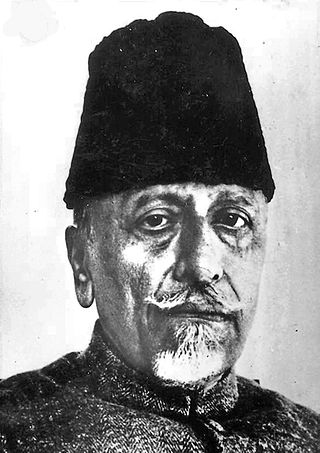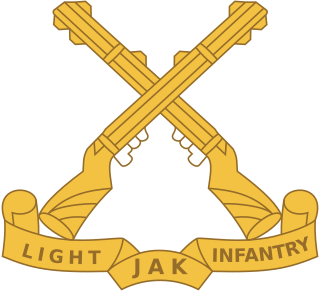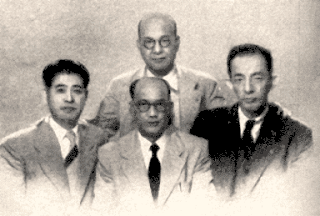
Azad Jammu and Kashmir abbreviated as AJK and colloquially referred to as simply Azad Kashmir, is a region administered by Pakistan as a nominally self-governing entity and constituting the western portion of the larger Kashmir region, which has been the subject of a dispute between India and Pakistan since 1947. Azad Kashmir also shares borders with the Pakistani provinces of Punjab and Khyber Pakhtunkhwa to the south and west, respectively. On its eastern side, Azad Kashmir is separated from the Indian union territory of Jammu and Kashmir by the Line of Control (LoC), which serves as the de facto border between the Indian- and Pakistani-controlled parts of Kashmir. Geographically, it covers a total area of 13,297 km2 (5,134 sq mi) and has a total population of 4,045,366 as per the 2017 national census.

Abul Kalam Ghulam Muhiyuddin Ahmed bin Khairuddin Al-Hussaini Azad ; 11 November 1888 – 22 February 1958) was an Indian independence activist, writer and a senior leader of the Indian National Congress. Following India's independence, he became the First Minister of Education in the Indian government. He is commonly remembered as Maulana Azad; the word Maulana is an honorific meaning 'Our Master' and he had adopted Azad (Free) as his pen name. His contribution to establishing the education foundation in India is recognised by celebrating his birthday as National Education Day across India.

Leela Chitnis was an Indian actress in the Indian film industry, active from 1930s to 1980s. In her early years she starred as a romantic lead, but she is best remembered for her later roles playing a virtuous and upright mother to leading stars.

The Jammu and Kashmir Light Infantry is an infantry regiment of the Indian Army. The regimental center is in Srinagar's Airport Complex at Awantipora with a winter setup near Jammu. Its regimental insignia consists of a pair of crossed rifles. The regiment mostly consists of volunteers from the state of Jammu & Kashmir and ethnic groups from the state. The Jammu and Kashmir Light Infantry is considered to be one of the most decorated regiment of the Indian army having won 1 Param Veer Chakra and 3 Ashok Chakra. Naib Subedar Chuni Lal of the 8th battalion Jammu and Kashmir Light Infantry is one of the most decorated personnel of the Indian Army.
Kursath is a town and a nagar panchayat in Hardoi district in the Indian state of Uttar Pradesh. It has ten wards named: Jawahar Nagar, Azad Nagar, Gauri Nagar, Pant Nagar, Rajendra Nagar, Patel Nagar, Gandhi Nagar, Subhash Nagar, Ram Nagar and Ashok Nagar.

Subbier Appadurai Ayer was the Minister for Publicity and Propaganda in Subhas Chandra Bose's Azad Hind Government between 1943 and 1945, and later a key defence witness during the first of the INA trials. Ayer had travelled to Bangkok in November 1940 as a Special correspondent for Reuters before joining the Indian Independence League. In October 1943, Ayer was appointed the Minister of publicity and propaganda in the nascent Azad Hind Government.

Sardar Sikandar Hayat Khan was an Azad Kashmiri politician who served as the Prime Minister of Azad Kashmir for two non-consecutives terms. He also served as the President of Azad Kashmir twice. He was the longest-serving prime minister of Azad Kashmir, having served a total of more than 10 years across two tenures.

Ashok Kamte AC was an Indian police officer, serving as the Additional Commissioner of the Mumbai Police supervising the Eastern region. He was killed in action during the 2008 Mumbai attacks. He was posthumously given the Ashoka Chakra on 26 January 2009.

Bluff Master is a Bollywood drama movie released in 1963 directed by Manmohan Desai starring Shammi Kapoor, Saira Banu, Pran, and Lalita Pawar.
Raja Muhammad Zulqarnain Khan is an Azad Kashmiri politician who served as the President of Azad Jammu and Kashmir from 25 August 2006 to 25 August 2011. He was replaced by Sardar Muhammad Yaqoob Khan. Prior to this he served as Member of the Legislative Assembly of Azad Kashmir.
Sivaramakrishna Iyer Padmavati was an Indian cardiologist. She was director of the National Heart Institute, Delhi, and the founder president of the All India Heart Foundation. The institute collaborates with the World Health Organization (WHO) in training students in preventive cardiology. Padmavati was awarded India's second highest civilian honour, the Padma Vibhushan in 1992. Padmavati, an elected fellow of the National Academy of Medical Sciences, was the first woman cardiologist in India and established the first cardiac clinic and cardiac catheter lab in India.

Chaudhry Ghulam Abbas was a leading politician of Jammu and Kashmir and the President of the Muslim Conference party. After his migration to Pakistan administered Kashmir in 1947, he became the head of the Azad Kashmir (AJK) government.
Ashok Vihar is a neighbourhood in the North West Delhi district of Delhi, India. Situated along the Ring Road, Delhi, it is divided into four phases.

Arun Kumar Ahuja, popularly known as Aroon, was an Indian actor and producer who was active in Hindi cinema in the 1940s and early 1950s, appearing in over 30 films in both leading and supporting roles. He was married to singer and actress Nirmala Devi and is the father of actor Govinda.
Sitaram Seksaria (1892–1982) was an Indian independence activist, Gandhian, social reformer and institution builder from West Bengal, known for his contributions for the upliftment of Marwari community. He was a self-educated man. He was the founder of a number of institutions and organizations, including Shri Shikshayatan, a higher educational institution, Marwari Balika Vidyalaya, a primary school, Samaj Sudhar Samiti, a social organization, Bangiya Hindi Parishad, a literary society dedicated for the propagation and development of Hindi language and literature and Bharatiya Bhasha Parishad, a non governmental organization. For few years he also served as a minister in Azad Hind Fauj. The Government of India awarded him the third highest civilian honor of the Padma Bhushan, in 1962, for his contributions to society. His life story has been compiled in a book, Padma Shri Sitaram Seksaria Abhinandan Granth, edited by Bhawarmal Singhi and published in 1974. He died in 1982.
Desh Azad was an Indian cricketer and cricket coach.
The All India Azad Muslim Conference, commonly called the Azad Muslim Conference, was an organisation of nationalist Muslims in India. Its purpose was advocacy for composite nationalism and a united India, thus opposing the partition of India as well as its underlying two-nation theory put forward by the pro-separatist All-India Muslim League. The conference included representatives from various political parties and organizations such as Jamiat Ulema-e-Hind, Majlis-e-Ahrar-ul-Islam, All India Momin Conference, All India Shia Political Conference, Khudai Khidmatgar, Krishak Praja Party, Anjuman-i-Watan Baluchistan, All India Muslim Majlis, and Jamiat Ahl-i-Hadis. The Canadian orientalist Wilfred Cantwell Smith felt that the attendees at the Delhi session in 1940 represented the "majority of India's Muslims". The Bombay Chronicle documented on 18 April 1946 that "The attendance at the Nationalist meeting was about five times than the attendance at the League meeting."

Abhi Tailor is an Indian Tamil-language drama television series, starring Reshma Muralidharan and Madhan Pandian. The show is produced by Media Mogul and directed by Suresh Shanmugam. It aired on Colors Tamil from 19 July 2021, to 19 August 2022, every Monday to Saturday for 398 episodes. It is also available for streaming on Voot.











